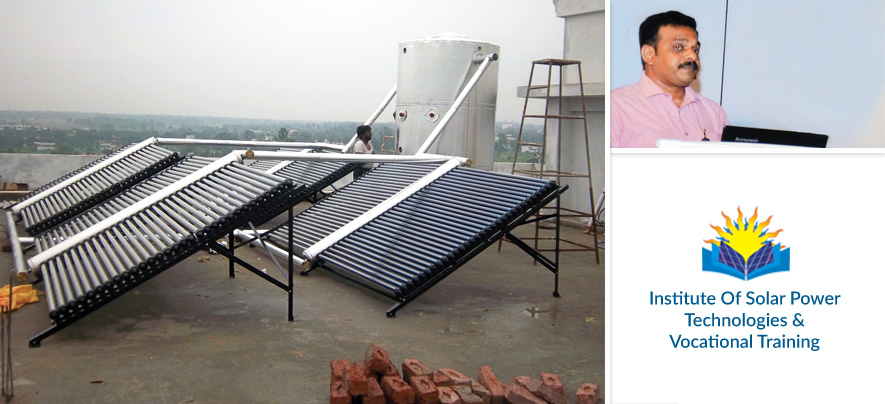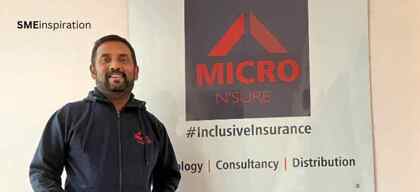Solar Power Is The Best Way To Kickstart The Economy

SME Inspirations
474 week ago — 10 min read
Some entrepreneurs have to break into an existing market, one that is already being served by other establishments. Other entrepreneurs have to create markets for their products and services where no demand exists. Both scenarios are common and have their own challenges.
But few entrepreneurs find themselves in the position of C. Vamsi Krishna, CEO of the Institute of Solar Power Technologies & Vocational Training and also of Solar Home Solutions in Hyderabad. When Vamsi Krishna left IIT Chennai in 2008, he knew as an entrepreneur that a vast market would be available for his passion – but it would be a market composed of people convinced this passion was not viable.
Vamsi Krishna’s passion is solar power. In a time of climate change and precarious resources of oil, coal and water, he is convinced solar power can be the most widely-used form of energy in India. With vast areas of the country yet to be part of the power grid, and a demand for electricity that cannot be met even in areas on the grid, it makes sense to harness an energy source that is cheap, clean and will be available till the end of time.
So he wondered: why is solar power still seen as unviable?
On-ground research showed him the answer – and gave him the basis of his business. After empowering himself with knowledge from his teachers Dr Kumaravel and Dr Srinivas Reddy, Vamsi Krishna travelled 30,000 km over the country, to understand the problem. He returned with a business idea: vocational training for rural micro-solar entrepreneurs – people who would install and maintain solar power equipment.
GlobalLinker spoke to Vamsi Krishna about his company, entrepreneurship, and how solar power can make the Indian economy brighter than anyone can imagine.
Excerpts from the interview.
GlobalLinker (GL): Tell us about the Institute of Solar Power Technologies & Vocational Training, please.
C. Vamsi Krishna (CVK): When I was a child, I watched a movie called African Safari. It showed how many children in Africa survived – by digging out roots and squeezing them for water.
India is not very different. When I travelled around the country to learn why solar power – which is not a new energy, it is 35 years old! – failed to take off, I saw children doing the same thing. I saw the real India. In a tribal hamlet on a hill, 14 km from the nearest public health centre (PHC), I saw a pregnant woman who had been bitten by a snake being carried to the PHC on foot. When she got there, she died, because the anti-venom had expired since there had been no electricity at the PHC for three days.
The government has been promoting solar power, but there has been no formal training in installing and using the equipment. So when people use solar power, they find it difficult. And by word of mouth, solar power acquired the reputation of being something that doesn’t work.
On my travels, I thought of empowering and creating rural micro-entrepreneurs to provide solar power to every mandal. These micro-entrepreneurs would require vocational training. And that was the basis of the Institute of Solar Power Technologies & Vocational Training.
GL: You started a business providing training in a field that had a poor word of mouth reputation and no training background. How did you make it work?
CVK: In my estimate, at least one million people could benefit from formal vocational training in solar power. But we had such a poor response when we began that we had to support ourselves by first trading in solar power products and then, because the quality of the products was not consistent, manufacturing the equipment ourselves. But training was always our primary objective.
We faced lots of challenges because we were the first entrants in this field. We had to simultaneously show people the opportunities available in solar power, and train them to create their own micro-businesses in it. Because there had never been any training in this field, there was no training content available. I had to create it myself, based on my own education in IIT Chennai. And since the kind of people we are targeting for training can just about read and write, we had to make the content simple, yet instructive, in 16 languages.
We also had to promote the cause of solar power. I cannot tell you how many government departments we visited, asking not for financial support, but support for the cause. All we wanted was word of mouth endorsement that solar power is good, useful, cheap, sustainable, and commercially viable. But such support was hard to find.
We also realised that since our target audience for vocational training comprised school dropouts, we might be able to convert them to the idea of solar power as a micro-entrepreneurship, but they would not have the money to invest in setting up micro-entrepreneurships.
GL: How did you fund your business?
CVK: From our own pockets. And, to start with, by doing everything ourselves – even installing solar water heaters for clients.
Getting a bank loan was difficult. If an industry has a proven track record, banks will give you red carpet treatment. But if you are the first entrant in an industry, you get nothing. Banks are also wary of providing loans to companies in the service sector.
GL: This sounds stressful. Why did you want to be an entrepreneur straight out of college?
CVK (Laughs): Entrepreneurship is an addiction. People can be rehabilitated even from a drug addiction, but entrepreneurs can never give up their addiction.
GL: How has your business done in the seven years since you started it?
CVK: My mother, Mrs Rajeswari, and my wife, Mrs Arti Reddy, provided great support. My wife, in fact, earned the bread in my family. For the first two or three years we had only 250-300 students a year, and I went into debt by a crore and a half. But today there is awareness about solar power – Prime Minister Narendra Modi has campaigned for it very well. So in 2014, business picked up. By now, we are firmly established. I cannot say we have our bread and butter: there is still no butter on the bread (laughs). But we have our bread.
GL: Have you received no support from government departments?
CVK: To be honest, I find most government ventures tied up in too much red tape. Also, government departments tend to launch solar power schemes without providing training. I was called to visit one such scheme and saw that the equipment had been wrongly installed. No wonder it didn’t work. No wonder solar power gets a bad reputation.
But in 2014, Ministry of New & Renewable Energy (MNRE) gave me a work order to train 180 people. That is the start of our success, thanks to Dr P.C. Pant, the HRD director at MNRE, who had been watching our work.
We also work with the National Skills Development Corporation. And recently, became a professional training associate of the Khadi & Village Industries Commission, which will enable us to certify our students by KVIC, which in turn will make them eligible for collateral-free loans.
And the Ministry of Skill Development & Entrepreneurship is promoting the Mudra scheme to all those students who undergo training to become entrepreneurs. So we can now not only train students, but put them in a position where they can invest in their micro-businesses.
GL: How will solar power truly benefit the nation?
CVK: Let me give you just one example. If a neighbourhood of 10,000 homes installed a 100-litre solar power heater to provide all their homes with hot water, it would save eight megawatts of energy in just one hour at peak time. Do you know what eight megawatts of energy can do? If that energy was diverted for productive use by industry, it could create wealth for employees by way of jobs and increments. This would increase their purchasing capacity. And this would kick start economic activity.
Eight megawatts of energy would also provide children in rural areas with light for their studies. The electricity freed by your neighbourhood could provide opportunities for small business people and energy for micro-rural entrepreneurs. And it costs just Rs 16,000 and the cost of relevant plumbing. It’s the best way to kick start the economy.
C. Vamsi Krishna is one of the many business owners to access the Big Business Advantage on GlobalLinker. Because there are no small and medium dreams.
Disclaimer: This article is based solely on the inputs shared by the featured member. GlobalLinker does not necessarily endorse the views, opinions & facts stated by the member.

Posted by
GlobalLinker StaffWe are a team of experienced industry professionals committed to sharing our knowledge and skills with small & medium enterprises.
View GlobalLinker 's profile
SME Inspirations
Most read this week













Comments
Please login or Register to join the discussion